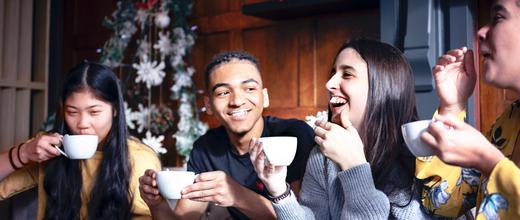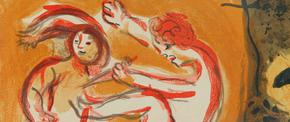The views expressed in our content reflect individual perspectives and do not represent the authoritative views of the Baha'i Faith.
During the holidays, I’ve reflected on the reaction of friends and family to my practice of not consuming alcohol.
I’ve tried to imagine how, if I stated I was vegetarian, it would be rare for them to pressure me to “have just a little” or say “it cooks out,” or ask “why not just this once – we’re celebrating.”
Even when I describe it as my choice to follow this spiritual practice as part of being a Baha’i, they still urge me to make an exception based on the circumstance. After all, what could it matter to eat some delicious dish that had wine added to it, when the alcohol cooks out? No doubt they think me rigid or fanatical for not bending the rules I voluntarily adhere to in cases where there appears to be no harm to anyone for doing so.
I ascribe their perplexity at my behavior to what I call the “shopping cart” approach to religion.
I practiced that approach myself before I learned about the Baha’i Faith. Searching for truth beyond what Sunday school had taught me as a child, I took whatever ideals and spiritual principles I liked from Christianity, Buddhism, New Age beliefs and anything else that came my way, and put them in my religious shopping cart. Left up to my own (doubtful) wisdom, I had plenty of room for changing my mind at every juncture, and no consequence when I did.
My soul wasn’t satisfied with this odd mixture, though. I longed for an eternal truth somewhere that could answer my biggest questions about life. I wondered about the origin of my consciousness, the nature of true reality, whether or not there was a purpose to each individual life, the place of pain and suffering in our existence, and how we could organize ourselves to achieve peace and justice. These and other questions propelled me to continue reading, talking and asking for guidance – from a God I wasn’t sure I even believed in.
When I began studying the Writings of Baha’u’llah and Abdu’l-Baha I found the eternal truths I had longed for expressed in beautiful poetry, prose, mystical writings and prosaic guidance for personal and collective advancement. Becoming a Baha’i represented a commitment to and an acceptance of that truth. How could I change, alter, omit or disregard the teachings of Baha’u’llah when I had come to regard him as a manifestation of God?
… since there can be no tie of direct intercourse to bind the one true God with His creation, and no resemblance whatever can exist between the transient and the Eternal, the contingent and the Absolute, He hath ordained that in every age and dispensation a pure and stainless Soul be made manifest in the kingdoms of earth and heaven. Unto this subtle, this mysterious and ethereal Being He hath assigned a twofold nature; the physical, pertaining to the world of matter, and the spiritual, which is born of the substance of God Himself. He hath, moreover, conferred upon Him a double station. The first station, which is related to His innermost reality, representeth Him as One Whose voice is the voice of God Himself. – Baha’u’llah, Gleanings from the Writings of Baha’u’llah, p. 66.
When I follow Baha’u’llah’s admonition to avoid alcohol, I gain no ascendancy over my fellow human beings who do love a good wine or rum pudding. Instead, it means that I’m making a conscious offering to exemplify my personal love and gratitude for God’s grace and mercy. Such a small act is as nothing – it heals no wounds of a suffering humanity, feeds no starving souls and ends no wars – but in its offering my own spirit is reinforced in its dedication to follow the larger Baha’i principles, such as love for all humankind.
When I (hopefully graciously) refuse an offering of celebratory champagne, home brewed beer or Jamaican rum chicken, it does mark me as different in people’s eyes. But I hope it is the difference that Abdul-Baha desires for me, and not the separation that divides us from each other:
I desire distinction for you. The Baha’is must be distinguished from others of humanity. But this distinction must not depend upon wealth – that they should become more affluent than other people. I do not desire for you financial distinction. It is not an ordinary distinction I desire; not scientific, commercial, industrial distinction. For you I desire spiritual distinction – that is, you must become eminent and distinguished in morals. In the love of God you must become distinguished from all else. You must become distinguished for loving humanity, for unity and accord, for love and justice. In brief, you must become distinguished in all the virtues of the human world – for faithfulness and sincerity, for justice and fidelity, for firmness and steadfastness, for philanthropic deeds and service to the human world, for love toward every human being, for unity and accord with all people, for removing prejudices and promoting international peace. Finally, you must become distinguished for heavenly illumination and for acquiring the bestowals of God. – Abdu’l-Baha, The Promulgation of Universal Peace, pp. 189-190.
Although my journey to the Baha’i Faith was and is one of constant learning, the certitude that it is the path for me, and the joy I find in having it in my life vastly outweighs the temporary enjoyment of a bit of dessert!

















Comments
Sign in or create an account
Continue with Facebookor